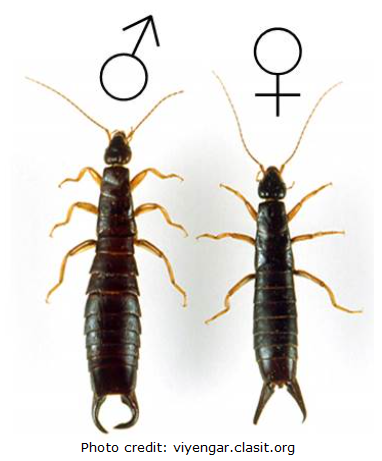Article and photos submitted by Doreen Coyne, a member of the Richmond Hill Garden & Horticultural Society
You know those crawly critters with the pinchers on their tail end. Named because they do like to hide in dark, narrow places in the garden, Earwigs are a common garden inhabitant and it seems like everything in the garden may have a few hiding in it or under the leaves. Especially vegetables.
As seen in the photo below, the male earwig has curved pinchers while the female’s pinchers are straighter. Males tend to use theirs to challenge other males during the mating season according to a recent speaker I heard. Female earwigs are very maternal and will protect their young for about a month! Who would have guessed? So, earwigs do have some good qualities!

How do you know if it is earwigs that are causing issues in your garden?
Earwigs, eat holes in the leaves of plants and don’t leave tell-tale droppings such as those left by scavenging caterpillars. Slugs leave a slime trail as they move over your plants. Earwigs eat holes in your plants and plant leaves. On the plus side, earwigs can be beneficial in the garden as they are known to eat aphids and insect larvae although they feed mostly on decaying plant matter. But holes in the leaves of your flowers and vegetables can be annoying so let’s find out how to get earwigs out of your garden.
After much research, it turns out the best trap is one that contains any fishy-smelling oil - tuna, salmon, sardines, or even smoked oysters. Some use a vegetable oil but add a small amount of Soya sauce to it. To make what folks commonly call an “oil trap” simply bait a small container with fishy-smelling oil in it. This type of trap is known to attract and catch ten or more earwigs in one night. This is more than others types of traps tend to catch.
For a container, I’ve used a more rigid tin one that came with Italian take-out. But really any aluminum tray that isn’t very tall is good - that came from take-out food or a dollar store would do the trick. If the tray is 2” to 4” tall, it will work well. Perhaps a used plastic margarine container could be used as well and they are easy to find.
I have read that some people bait the trap with canola oil and others add bacon grease or hamburger fat as the smell of grease and oil attract the earwigs. But I’d fear that smell of food would attract raccoons and other larger animals that you don’t want to invite to your backyard.
A recent “Gardening Know How” article suggested testing the usage of a lid with entry holes over the container. The idea was that it allowed the container to be emptied of bugs and refilled with fish oils periodically allowing you to catch earwigs over an extended period of time or if your move the trap, it could be used in several different spots within your garden.









